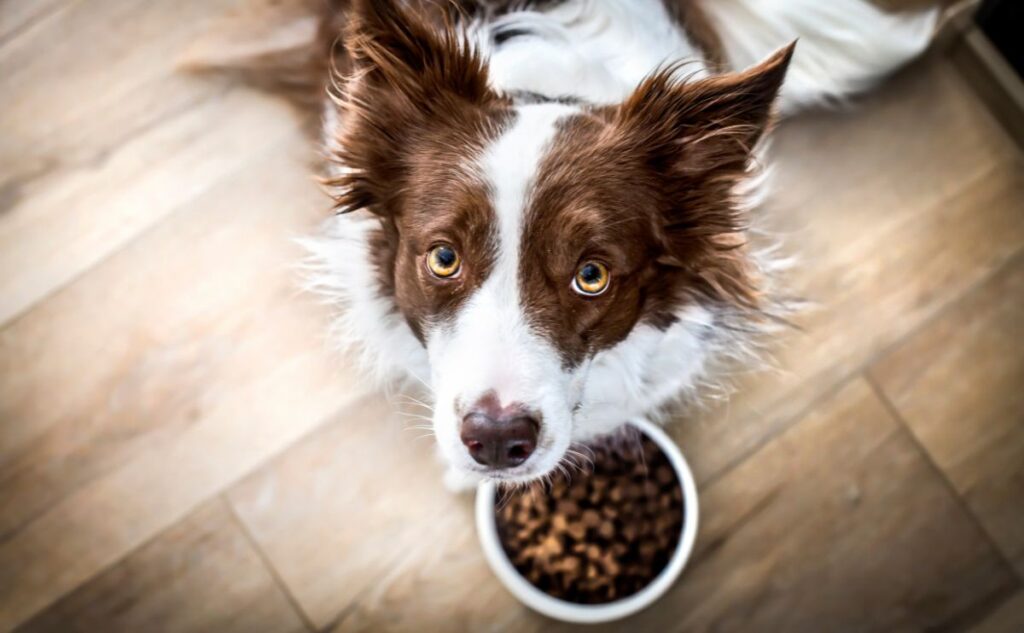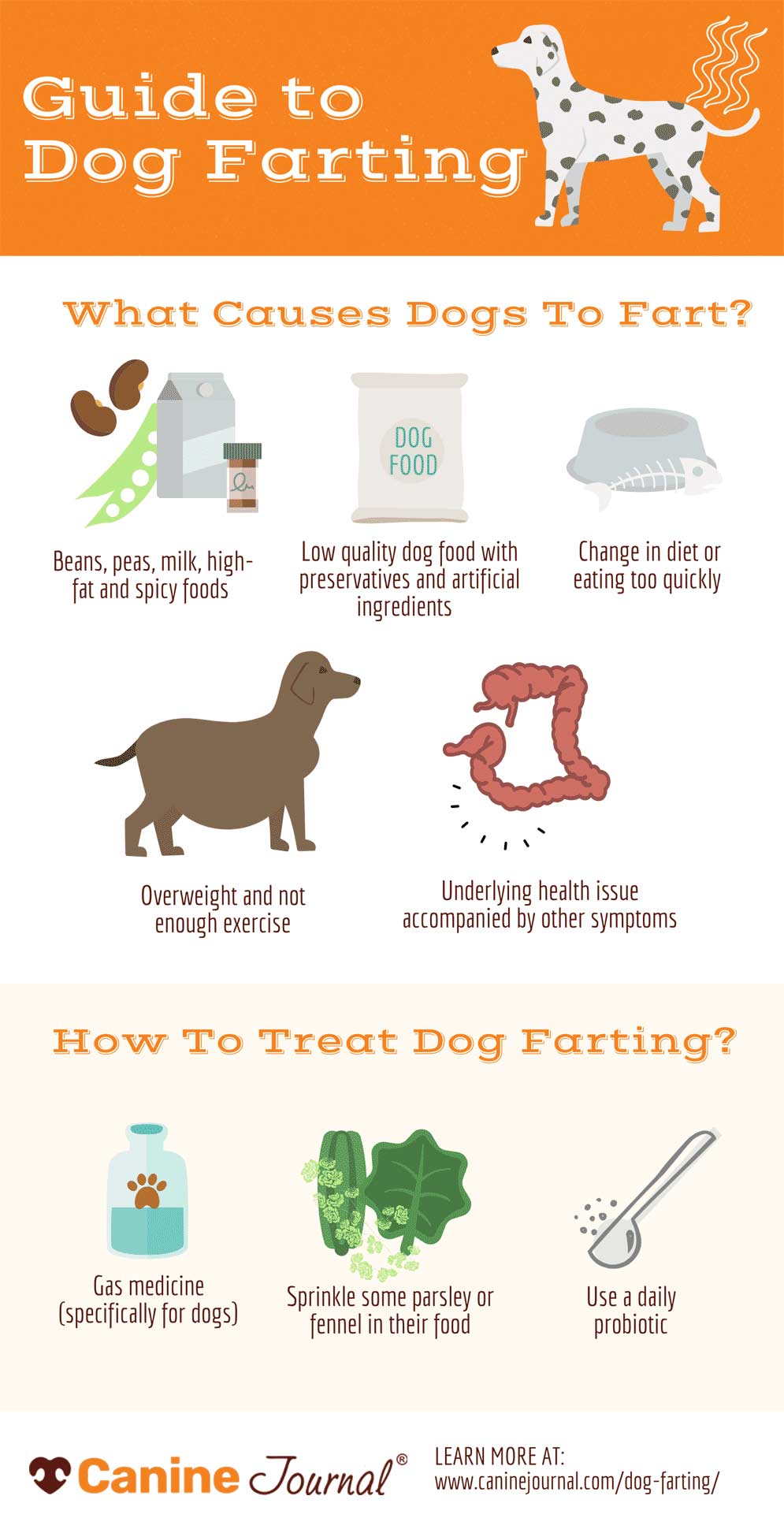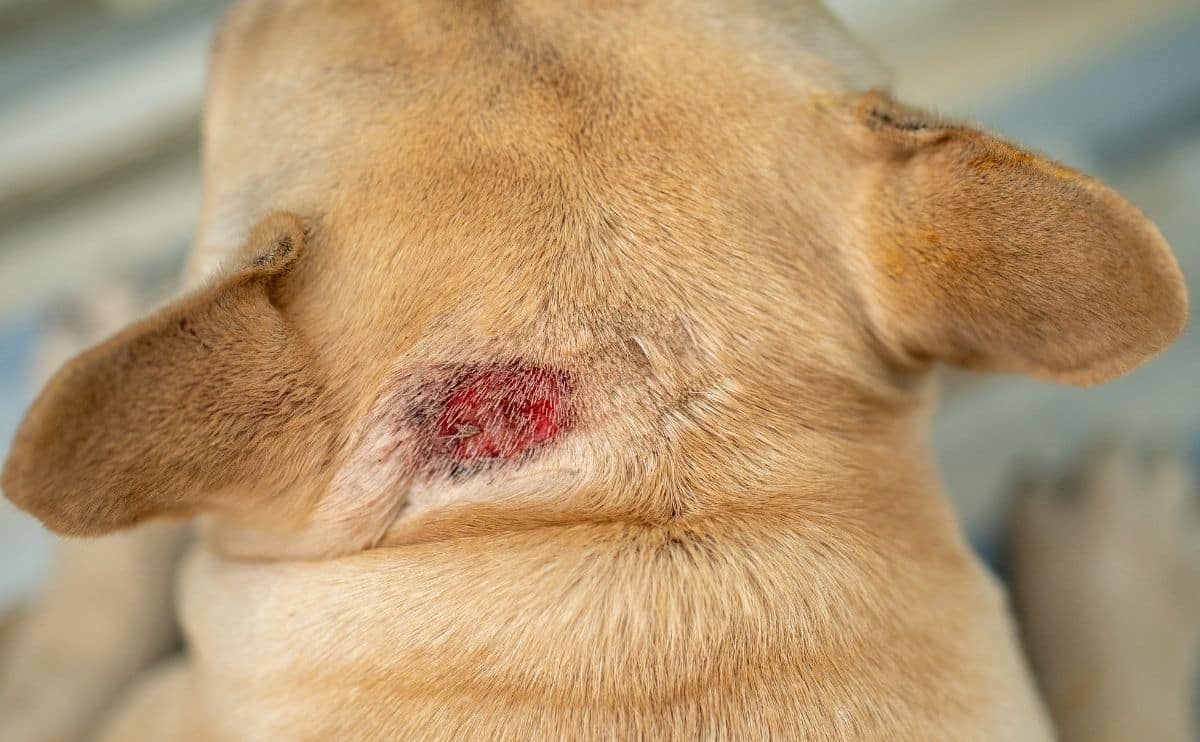The Gassy Truth About Your Dog’s Back-End Blasts & Home Remedies That Actually Work
When you purchase through links on our site, we may earn a commission. Here’s how it works.
Let’s just say it, your dog’s farts are ruining lives. One minute, you’re enjoying a peaceful cuddle on the couch. The next, you’re gasping for air, questioning your life choices, and wondering if something died under the floorboards. Spoiler alert: it’s your pup’s butt, and yes, dogs fart a lot.
Table of Contents
If you’ve ever typed “Why does my dog fart so much?” with one hand while holding your nose with the other, you’re in the right place. Whether your pooch toots like a foghorn or delivers stealth stink bombs that could clear a dinner party, there’s a reason behind the odor. Fortunately, there are a few ways to fix it.
In this guide, I’ll sniff out the science behind canine flatulence, break down the foods and habits causing those noxious emissions, and share vet-approved, nose-saving remedies that’ll take you from gag to wag in no time.
Why Does My Dog Fart So Much?
Farting is normal in dogs, and it’s totally healthy for our bodies to produce gas that accumulates within the gastrointestinal (GI) tract. But if your pup’s toots could double as chemical warfare, there might be something else going on. So, what causes chronic gas problems? There are several reasons why your dog might be gassier than usual:

1. Their Diet Might Be The Culprit
Just like with people, certain ingredients can trigger gas in dogs. Foods with excessive fiber, low-quality fillers, or dairy can lead to excessive fermentation in the gut. Many dogs (and cats) are lactose intolerant, and feeding them milk or dairy products often causes gas and an upset stomach. And some dogs are sensitive to grain products.
Ingredients that commonly cause dog flatulence include beans, soybeans, peas, milk products, high-fat diets, and spicy foods. For some Fidos, that means unpleasant odors. If you’ve got a gassy pup, it’s also important not to feed your dog table scraps. Or at least be careful about what you give them from your plate.
Tip: Check the ingredient list on your dog’s food. Words like “byproduct,” “meat meal,” or “animal digest” can be red flags for digestion issues.
Consuming Low-Quality Dog Food
Many dogs struggle to digest mass-produced commercial dog foods that contain a high amount of preservatives and artificial ingredients. These foods can cause excessive fermentation in the colon, which produces a lot of gas. If you’re feeding your dog cheap food, you may want to consider switching to a high-quality diet instead. More on this and the best foods for gassy dogs later.
Too Much High-Fiber Or Rich Ingredients
Even some “healthy” foods can cause issues. Vegetables like broccoli, cabbage, or legumes are notorious for causing gas, even in humans. Dogs don’t digest complex carbohydrates or fiber in the same way humans do, which can lead to intestinal issues. If it makes you gassy, it’ll probably make your dog gassy, too.
They’re Adjusting To A New Food
If you’ve recently switched dog food or introduced new treats, your pup’s digestive system might be in protest mode. Gradual transitions are crucial in preventing gas explosions. It can take a week or two for your dog’s tummy to adjust to a new diet. If your dog’s gas symptoms persist after a few weeks, you may want to consider an alternative diet or return to the original food.
They Eat Too Fast
Some dogs inhale their food like it’s a competitive sport, especially after exercise. Also known as aerophagia, a fancy word for the same outcome. The swallowed air has to come out eventually – yep, that way. Research indicates that it is also common in brachycephalic breeds, such as Bulldogs, Pugs, and Boxers, as well as in dogs that are nervous or anxious. Fortunately, this type of gas usually isn’t smelly. Eating too fast can also cause indigestion.

2. Stress Or Anxiety
Yes, your dog’s emotional state can literally mess with their digestion. Stress can impact gut motility, leading to gas buildup or irregular digestion. Common stress triggers sometimes include:
- Loud noises
- Moving homes
- New pets or visitors
- Being left alone for too long
Our Personal Experience With Dog Gas As A Result Of Stress
My dog Bonkers has always had a peculiar quirk. His gas seems to have a direct line to his stress levels. Whenever we start packing our bags for a trip, it’s like his internal gas engine revs up. As soon as he senses we’re about to leave, the farts begin. It’s almost as if Bonkers is protesting our impending absence with a chorus of toots.
Not only does he launch into his signature stress farts, but Bonkers also tends to go off his food during these moments. It’s as though the anxiety takes over his appetite completely, leaving him too flustered to enjoy his usual meals. No wonder his tummy gets all rumbly, beccause stress and skipped meals rarely mix well, even in a canine!
– Emma Braby, Dog Mom & Write For Canine Journal
3. Poor General Well-Being
Dogs who are overweight, too sedentary, or both have a higher risk of developing chronic flatulence, regardless of what they eat. Just as with humans, dogs’ digestive systems function more efficiently when they are active and not overweight. Help your dog lose weight and take them out for regular walks.
4. There Could Be A Medical Issue
But what if the stink signals something more serious? Here’s how to tell when your dog’s gas is just dinner disagreeing and when it might be your dog’s way of saying, “Hey, something’s wrong in here.”
If your dog’s gas is frequent and foul, accompanied by other symptoms, it may indicate an underlying gastrointestinal (GI) condition. These conditions may include inflammatory bowel disease, intestinal parasites, pancreatic insufficiency, or other gastrointestinal disorders.
Red Flags That The Farts Are More Than Just Funk
If your dog’s gas is paired with any of the following, it’s time to raise a (smelly) red flag:
- Excessive bloating or a tight, swollen belly
- Loss of appetite
- Lethargy or unusual fatigue
- Frequent vomiting or diarrhea
- Sudden weight loss
- Audible tummy gurgling that sounds like a dishwasher full of gravel
- Excessive drooling or lip-licking
- Lots of farts that smell truly abnormal (like sulfur, rotten eggs, or metallic)
Be sure to contact your veterinarian if your dog exhibits any of these additional symptoms to help rule out underlying health issues. According to VCA Animal Hospitals, persistent gas paired with other symptoms may require blood work, fecal testing, abdominal X-rays or ultrasounds, intestinal biopsies, or a diet trial to identify the cause.

Know The Difference: Gas vs. Bloat
One condition that every dog parent should be aware of is bloat, also known as gastric dilatation-volvulus (GDV). It’s rare but deadly, and it can start with what looks like gas. Call your vet immediately if your dog has:
- A bloated, hard abdomen
- Non-productive retching (trying to vomit, but nothing comes out)
- Rapid breathing or collapse
Bloat is an emergency. Don’t wait it out or assume it’s just another stink attack.
If You’re Not Sure, Trust Your Gut (& Your Nose)
If your dog’s farts have changed in frequency, intensity, or smell, and especially if other symptoms pop up, trust your instincts. Call your vet, rule out the big stuff, and breathe easier (literally).
6 Dog Gas Remedies That Actually Work
By now, you probably know what’s causing the stink. But how do you stop your dog from being a walking gas grenade?
If you’re wondering, “What can I give my dog for gas?” the good news is that you don’t have to live in a constant fart cloud. Whether you’re into natural remedies, vet-recommended products, or simple habit changes, there are plenty of ways to reduce your pup’s emissions. Let’s examine some effective immediate and long-term gas relief options for dogs.

1. Try A Vet-Approved Dog Gas Relief Supplement
Products with simethicone, digestive enzymes, or activated charcoal can help break down gas bubbles and reduce odor. It’s wise to look for brands formulated specifically for dogs.
Popular gas relief supplements for dogs:
You may wonder if you can give a dog Gas-X or similar human medications to relieve their immediate gas problems. The general consensus is that Gas-X and Pepto Bismol are relatively safe for dogs. However, it is always recommended to consult your veterinarian before administering any medications or supplements to your dog, especially those intended for human use.
We have a guide on the best digestive enzymes for dogs that can help reduce Fido’s flatulence.

2. Add A Daily Probiotic
If your dog suffers from chronic gas or digestive issues, a daily probiotic supplement for dogs may also be beneficial. Probiotics for dogs work the same way as they do for humans. They contain living, gut-friendly bacteria naturally found in the digestive tract and other parts of the body.
The goal of ingesting probiotics is to maintain healthy levels of beneficial bacteria, prevent gastro intestinal problems, and boost the immune system after it has been disrupted by illness, infection, antibiotic treatment, or other stressors. Probiotics can help balance your dog’s gut microbiome, improving digestion and reducing fermentation (a.k.a. stink production). Go for canine-specific products, not human pills.
Popular probiotic supplements for dog gas:
- NaturVet Digestive Enzymes Daily Digestive Support
- Zesty Paws Probiotics
- Purina FortiFlora Dog Probiotic
We have a comprehensive guide on the best probiotics for dogs, providing more information and expert tips to enhance your dog’s gut health.
3. Change Their Diet (Gently!)
Switching to a higher-quality diet can make a significant difference. Because the wrong kibble can turn your pup into a methane machine. So, if your dog farts like it’s their full-time job, it might be time to take a long, hard look at what’s in their bowl. The truth is that many cases of canine flatulence can be fixed (or at least improved) by changing their food.
Some dogs are sensitive to specific proteins, grains, or ingredients, and even high-quality food can cause a digestive revolt if it includes the wrong thing. I recommend testing for food intolerances with an at-home allergy testing kit.
What To Feed A Gassy Dog
It’s essential to look for diets that contain real, named proteins, such as chicken, salmon, and lamb, along with healthy carbohydrates and fats, as well as vitamins and minerals. Cheap dog food often contains ingredients such as artificial additives and meat byproducts, which can irritate a dog’s digestive system.
Sometimes, changing your dog’s diet to high-quality dog food is all it takes to reduce their gas and improve their gut health. You could also consider other diets such as:
- A high-quality fresh diet
- Foods for gassy dogs
- Grain-free dog food
- Hydrolyzed dog food
- Limited ingredient diets
- Sensitive stomach formulas
Some of the fresh delivery companies even customize your dog’s food for specific health concerns, including digestive issues.
Transitioning Your Dog’s Diet
Introduce the new food gradually over 7–10 days to minimize digestive upset. Even if the formula is similar, it’s essential to take it slowly. Licks Digestive Aid can help your dog during the transition phase for temporary relief from gas. These individual gel packets are made with 100% all-natural ingredients and utilize digestive enzymes to break down proteins, starches, and fats while enhancing the absorption of essential vitamins and minerals.
4. Slow Down Mealtime
If your dog eats like they’re trying to win a speed-eating contest, they’re probably swallowing a lot of air. There are a few solutions to this problem, including:
- Using a slow feeder bowl
- Try a puzzle toy that makes them work for food
- Break meals into smaller portions
- Create a calm feeding area to reduce anxiety or food aggression

5. Cut The Table Scraps
I know it’s hard to say no to those eyes, but human food is often loaded with fat, grease, dairy, and ingredients that don’t sit well with doggy tummies. Even a small amount of bacon grease can trigger the gas alarm.
6. Natural Home Remedies For Dog Gas
Looking for more holistic solutions? Some dog owners swear by:
- Canned Pumpkin: It is packed with soluble fiber, which helps slow down digestion and absorb excess water in the digestive tract. This promotes smoother bowel movements and can reduce fermentation in the gut, which means less fart fuel. Just make sure it’s pure, not pie filling.
- Ginger: This ingredient can help calm excessive gas buildup. It may help food move more efficiently through the system, minimizing fermentation. Only give tiny amounts under guidance.
- Apple Cider Vinegar: Some holistic pet advocates claim that ACV can help rebalance gut acidity, making the environment less favorable for gas-producing bacteria. This isn’t fully proven, but some pet owners report mild improvements.
- Fennel: It can help your dog release gas more gently or prevent it from building up in the first place. Sprinkle a little fennel (dried or fresh) on your dog’s food.
- Parsley: It can reduce odor in the digestive system and even ease bad breath. You can chop up a couple of tablespoons of fresh parsley and sprinkle it on your dog’s food.
Again, always consult your veterinarian before experimenting with kitchen chemistry.
Are Some Dog Breeds Just Gassier Than Others?
If it feels like your dog is setting new records in the fart department while your friend’s pup sits daintily and scent-free, you’re not imagining things. Some breeds are naturally more prone to gas, thanks to their anatomy, eating habits, and genetic quirks.
Let’s break down the usual suspects.
Flat-Faced Breeds
- Bulldogs
- Pugs
- French Bulldogs
- Boxers
- Boston Terriers
These dogs have adorable squished faces and a tendency to inhale half the atmosphere when they eat. All that swallowed air builds up in their gut and exits however it pleases. Brachycephalic syndrome means a smooshed face in the front and a gas leak in the back.
Food-Sensitive Breeds
Some breeds are more prone to food intolerances or sensitive stomachs, which can lead to chronic dog farting if they are not on the right diet.
These include:
- Labrador Retrievers
- Cocker Spaniels
- Yorkshire Terriers
- Dachshunds
If your dog is one of these, even a small dietary change or too many treats can result in a symphony of stink.
Greedy Hounds
These enthusiastic eaters tend to vacuum their food and will eat almost anything, edible or not. That speed-eating behavior leads to air intake, and their love of foraging can introduce foods their gut isn’t exactly thrilled about.
More Than Gas: Treating Your Dog’s Upset Stomach
In addition to frequent gas, does your dog occasionally experience tummy aches? If so, be sure to read our tips on curing a dog’s upset stomach, which include product recommendations, home remedies, and symptoms that could indicate a more serious problem.
And finally, what would an article about dog farting be without a funny video? I just couldn’t resist. Does this remind you of your home?
Frequently Asked Questions About Dog Farts
Let’s face it, when your dog’s farting like a foghorn, you’ve probably got a few questions. Whether you’re wondering if it’s normal, what to feed them, or how to survive a road trip with the windows up, we’ve answered the most common dog farting questions below. Still curious (or just need to vent about your pup’s latest stink bomb)? Drop your question in the comments; we’d love to hear from you!
Why Do Dogs Fart?
It’s a normal part of digestion, just like it is for humans. Gas forms in the gut as food breaks down, and when it builds up? Out it goes. Some dogs are sneakier than others, but yes, all dogs fart.
Why Does My Dog’s Fart Smell So Bad?
Blame poor digestion, food ingredients, or gut bacteria. Smelly farts often mean your dog is having trouble breaking down something in their diet, especially things like soy, meat byproducts, dairy, or table scraps.
Is It Normal For My Dog To Fart A Lot?
A little gas? Normal. A lot of gas? Worth investigating. If your dog farts constantly or clears the room regularly, it could be due to:
- Eating too fast
- A low-quality or too-rich diet
- Food intolerance
- Stress
- Digestive imbalance
- Or something more serious like IBD or parasites
Many of these can be resolved at home, and others require veterinary intervention.
Can I Give My Dog Gas-X Or Human Gas Medicine?
Perhaps, but consult with your veterinarian first. Some vets recommend simethicone (Gas-X) in small doses for dogs, but you should never self-medicate without guidance. Certain meds (like Pepto-Bismol or antacids) can be harmful depending on your dog’s breed or condition.
Does Pumpkin Help With Dog Gas?
Yes. Plain canned pumpkin is rich in soluble fiber, which helps regulate digestion and ease mild gas or upset stomachs. Just make sure it’s 100% pure pumpkin, not pumpkin pie filling.
Are Certain Dog Breeds More Gassy?
Yes. Flat-faced (brachycephalic) breeds like Bulldogs, Pugs, and Frenchies are infamous for their gas. They swallow more air when eating and tend to have more sensitive digestion. Other greedy pups eat super quickly or anything they can get their paws on, which often increases their flatulence habits, too.
When Should I Be Worried About My Dog’s Gas?
If your dog’s gas is accompanied by vomiting, diarrhea, bloating, appetite loss, behavioral changes, or is increasing in frequency or smell, it’s time to call your vet. It could be a sign of a deeper issue, like food allergies, intestinal parasites, or a condition like IBD or bloat.
Keep Your Pup Healthy Beyond The Farts
Dog farts may be funny, but they’re also a reminder that gut health matters and it’s just one piece of the bigger wellness puzzle. Annual checkups are essential, as they help catch problems early, including allergies or early signs of disease that may be contributing to your dog’s gas. Don’t forget about regular worming, which helps protect your pup from internal parasites that can wreak havoc on their digestive system. And, of course, keeping your dog up to date on vaccinations ensures they’re protected from serious illnesses that can also affect their overall health and gut balance. Finally, if you haven’t looked into it yet, pet insurance can be a smart way to prepare for emergency vet bills.
Got a gassy pup of your own? Share your funniest, weirdest, or most explosive fart stories in the comments. We promise no judgment (just laughs).
Why Trust Canine Journal
Sally has over 20 years of experience in human health sciences communications, with the past decade focused on pet health conditions and treatment. As part of the dedicated team at Canine Journal, made up of canine professionals and lifelong dog lovers, she helps research and test the best products for happier, healthier pups. From serious conditions to the science behind dog farts, Sally brings clarity (and a little humor) to the world of pet care.


